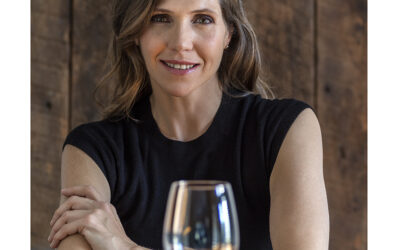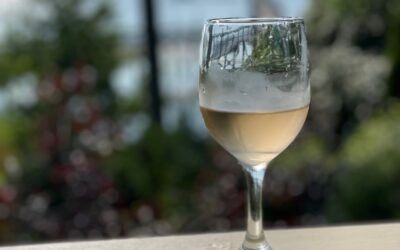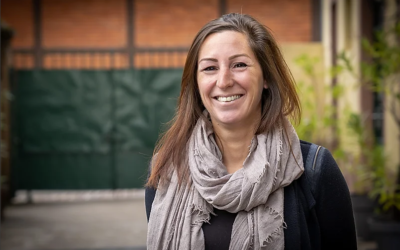CHARLOTTE DE SOUSA IS UNIQUELY LEADING THE MOVEMENT TOWARDS A MORE INCLUSIVE INDUSTRY
The story of Champagne DE SOUSA is one of family values and ethics of respect for nature.
An atypical success story that has its original roots outside of Champagne, all the way down
South on the Iberian Peninsula. Champagne DE SOUSA is the only Champagne House of
Portuguese origins. Manuel DE SOUSA was among the many Portuguese soldiers called to fight
in the French trenches during The Great War.
Post-World War I, Manuel, seeking a better future for his family, moved his wife and newborn
son, Antoine, from Braga near Porto to Avize in Champagne’s famed Côte des Blancs. Sadly, a
brain tumor would tragically claim his life at the young age of 29. Still fate had not yet spoken
its last word! If Manuel never got to realize his dream of a “better life”, Antoine would.
Now a young man, Antoine changed the course of the family’s destiny when her met and
married Champagne native Zoemie. Together they founded Champagne DE SOUSA in 1950 and
launched a family tradition, spirit and culture passed on from generation to generation.
When second generation, Erick De Sousa (Antoine’s son) took over the estate with his wife
Michelle, he broke grounds by being one of the first winegrowers in the Cote des Blancs to have
the foresight to champion biodynamics in the region well before it became le mot du jour.
Champagne De Sousa spans 14 hectares over 93 different parcels and produces around 100,000
bottles a year. The House stands out for its exceptional champagnes that are defined as
gourmet, mineral and fine.
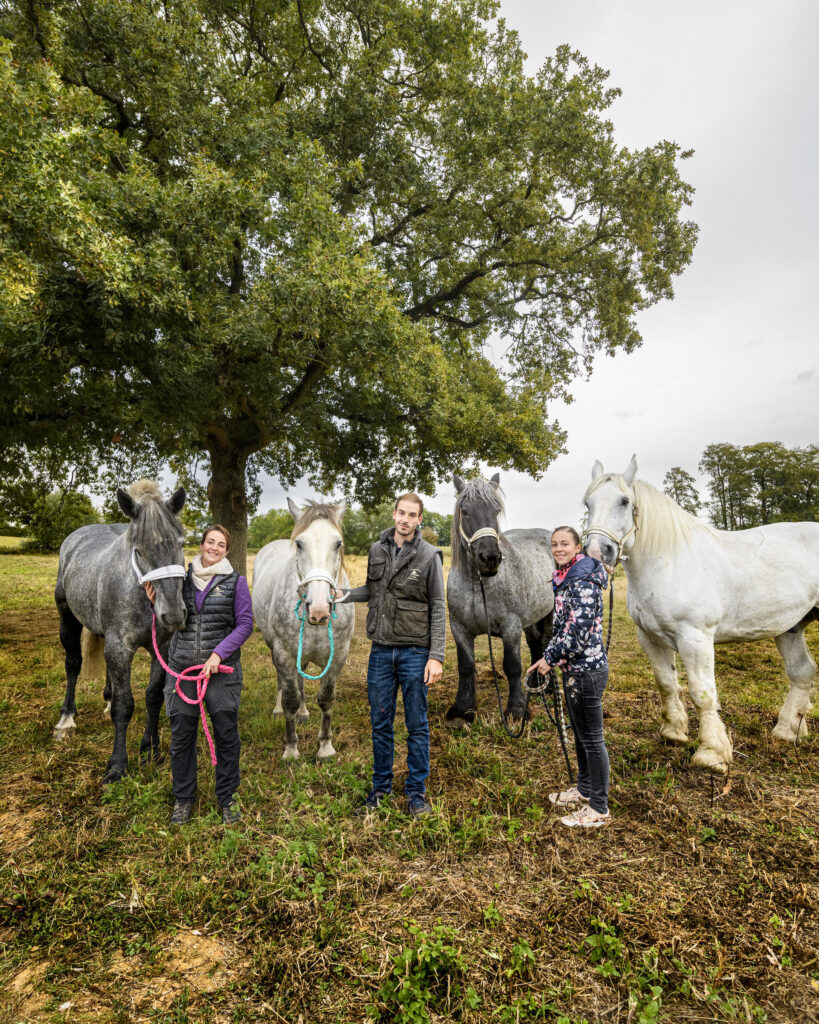
Vines older than 50 years plunged deep into the soil, fermentation in oak barrels, “batonnage”,
natural yeast to initiate the first fermentation, use of malolactic fermentation, sparing use of
Sulphur dioxide, ancient practice of “poignettage”, horse plowing as well as hand riddling, and a
prise de mouse to the classical sound of Mozart are all the unique and special elements part of
the Champagne De Sousa foundation and exceptional savoir-faire that encapsulates the
House’s essence: “Un champagne de precision” (a champagne of precision).
Today Erick’s children, Charlotte, Julie, and Valentin are at the helm of the House.
The third generation took the reins during the 2020 harvest with the same visionary leadership
and creativity as their predecessors.
Leading the marketing and Communications branch of the champagne house, Charlotte De
Sousa is already revolutionizing the Champagne industry. She is not only growing the house’s
diverse portfolio with the introduction of the tiny unique production cuvées Umami and
Mychorize, but she is also expanding and enhancing its profile and visibility by making the DE
SOUSA savoir-faire (know-how) more accessible and convenient to the deaf community.
A series of short videos translated into sign language have been released on YouTube to inform
and educate the deaf community about the history of the house, the cuvées and biodynamic
certification. (https://www.youtube.com/@leadechampagne7876/featured)
In addition, Charlotte and her sister have learned sign language to host deaf-friendly visits at
the estate. It is no surprise Champagne De Sousa has earned a reputation as one of the finest
Champagne houses on the Côte des Blancs.
It was such a distinct joy to chat with Charlotte de Sousa and highlight her incredible work.
Can you take us through the story of Champagne De Sousa? How did your family migrate from
Portugal to Avize in Champagne, France?
The history of the domaine start in 1950 after the wedding of Antoine DE SOUSA (my grandpa)
and Zoémie BONVILLE (grandma), she was a native of Champagne and my grandfather arrived
in France with his family when he was a child. it’s because of World War I that a lot of young
Portuguese men were called to help the French soldiers. My great grandfather (Manuel) was
one of them. After the war, he brought his family to live in France. This is how Antoine grew up
in Champagne, learned French and settled in France.
He met Zoémie, married her in 1948 and they created Champagne DE SOUSA in 1950.
Champagne De Sousa is a family affair. You, with your sister Julie and brother Valentin, are the
fourth generation at the helm of the house. Did you always know you would join the family
enterprise?
It came naturally with time around 16-17 years old.
My siblings and I organically found our way: the vineyard, trade, wine tasting…
Now we complement and help each other. We are very lucky to have a big house and enough
work share.
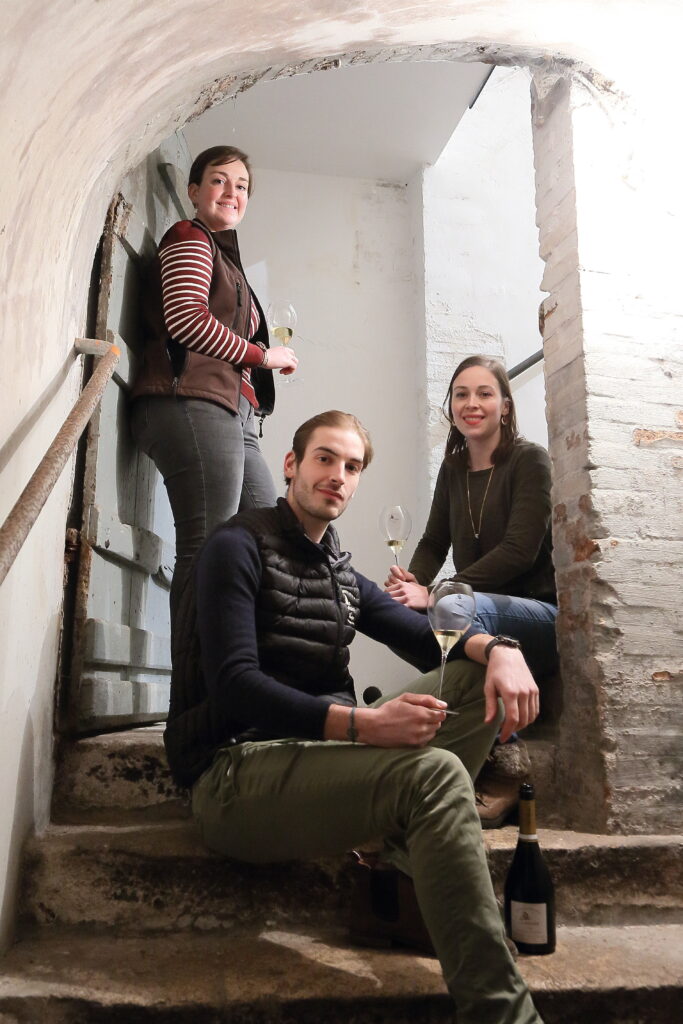
Since 2020 the three of us have been handling the house. Our parents gave us the key to the
family affair in 2020. They were the 3rd generation to make wine. We recently lost our father
from a long disease. He prepared everything before passing away to secure our future. So we
are now fully in charge of the business and want to make him proud, and pay homage to him
and his legacy.
Personally, I had another dream at the beginning when I was a teenager, but when you’re
growing older and gaining maturity you understand life better – the value of the family heritage and the house. All three of us studied in wine school and appreciate the experience.
Was it a natural calling?
It came naturally with time around 16-17 years old.
My siblings and I organically found our way: the vineyard, trade, wine tasting…
Now we complement and help each other. We are very lucky to have a big house and enough
work share.
From Manuel De Sousa to Antoine De Sousa then Erick De Sousa and now you and your siblings,
you all share anchored values of respect for the terroir, of quality, of innovation and family.
What does the De Sousa heritage mean to you and how do you hope it carries onto the next
generation?
Our father was the pioneer of organic viticulture in the Cotes des Blancs. He had a great idea
and good timing.
We want to do the same and keep the image our father gave to the House. We now have this
challenge to shoot for the stars and succeed. As for the next generation, it’s too early to know.
We’ll see!
Can you walk us through your role at Champagne De Sousa?
I oversee the finished bottles; after the prise de mousse I manage the time of maturity and
aging, the riddling process; I also buy the dry material, handle the marketing, sale, and trade. A
lot of different things so it’s never the same job every day! My sister Julie is the vineyard
manager, and horse plowing expert, and my brother Valentin manages the organic spray, the
blends, tastings and wine process.
Spanning 14 hectares over 93 different parcels, your vineyards are in the Grand Crus Villages of
Avize, Oger and Cramant in the Côte des Blancs. Most of these vines are old vines, 50 years or
older – a character trait that has become your Champagne House’s trademark. What role do
older vines play in the complexity, personality, and structure of your champagnes?
We increased the size of our domaine acquiring more vineyards. The oldest vines are the best
for quality and resistance. We love them! They are older than us and produce such good yields.
If you take care of them and respect them, they live to be very old. These vines are more
resistant because the roots go deep in the soil, more than 35 meters sometime. They are more
mature in ripeness due to lower yield. They produce better wines. We really respect our older
vines and nowadays a big part are plowed by horses to respect the soil and be less aggressive
under the soil.

Can you elaborate on the concept of what you call “pivot” roots – the idea that the deeper the
roots travel into the soil, the more the terroir will express itself in the wine.
When you plow your soil, the younger roots are cut by the plow, so the vineyards are obliged to
survive to go deep in the soil to find food and water. It’s very important! So, when you have the
pivot, the vines are more attached to the soil, deeper rooted to find the water deep in the soil
and used the natural food from the terroir and not the fertilizer……
Champagne De Sousa is certified organic since 2010 and certified Demeter biodynamic since
- Your father Erick De Sousa had the foresight to champion biodynamics in the region well
before it became sort of de rigueur. How important is it to have a greener Champagne? In what
ways does it influence the quality and the style of the wine?
The first idea was to increase the quality of the wines/Champagnes, and with the organic
approach my father found more natural flavors for the wines. It’s better for the soil and the
plant. What you chemically add to the soil are fake food (like protein for athlete) if you build up
your muscles naturally it is different than the “artificial” way bodybuilders do it… it is the same
idea here, the vines need to naturally increase their own immunity and be stronger to fight
diseases. The organic model is based on natural, respect and joy. The quality is natural, and the
terroir is expressing itself at its optimum. We have very very old vines and soil, and we need to
respect nature.
Speaking about environmentally friendly viticultural measures, you’re famously known for
being one of the rare Champagne houses that uses plowing with horses. What makes this
practice a viable option and how does it benefit the champagne?
It is not necessarily a viable solution because it takes more time than a machine. But for the
handling of very old vine, it is better, for the soil compaction is better. We use the horses on 4
hectares. It’s my sister Julie, who’s in charge of horse plowing. She works one row at a time.
The horses are gentler when it comes to roots and vine. Also, the quality of work is better.
That said, you must adore horses because it takes so much work !!!! it’s really a passion.
As I mentioned earlier, your vines are planted in the Côte des Blancs – Chardonnay’s holy
ground. Let’s talk about your renown Cuvée des Caudalies, which is 100% Chardonnay. Can you
share with us what goes into the elaboration of this exceptional Blanc de Blancs from vine to
bottle (the use of oak, perpetual reserve etc.)?
The grapes come from the best soils: Avize, Oger, Mesnil, and from old vines that are more than
60 years old. The blend of our cuvée des Caudalies is 50% of the vintage year and 50% of a
perpetual reserved (SOLERA system blend). My father started this Solera in 1995. It’s a unique
and rare blend in Champagne.
I know the word “Caudalie” has a specific significance. Can you share with us what it
means?
Feminine Work in Œnologie, It’s the unity of measure of the aftertaste in our mouth. You can
talk about the persistency of the wine in your mouth. After you swallow you can count the
seconds when it comes to how long you feel the flavor of the wine and this time is measured in
Caudalies.
One Caudalies equals One second.
You’re one of the seven members of “Les Fa’Bulleuses”. Can you tell us more about this
association?
We created les Fa’Bulleuses in 2014, firstly to help each other. It is not easy to be a young
woman in the Champagne World. We were dealing with the same issues, same questions, same
fears so it was really amazing and encouraging to meet other women who shared the same
sentiment. We can exchange ideas, talk, find help and good advice. It’s a really nice group;
there’s no judgement. It’s like a Sorority and « Bienveillance ». We now have business projects
to talk about women’s involvement in Champagne and communicate information about our
respective domains. We created a cuvée all together named « ISOS » which means “equal” in
Greek. We blend our seven wines to make a unique Champagne!
It’s our way to show our solidarity and passion for our craft.
Les Fa’Bulleuses among other female-centric organizations have helped women make
massive progress in Champagne, but still overall women remain a minority in the Champagne
world. What advice would you give to young women looking to forge a career in the industry?
We created les Fa’Bulleuses to be an example and role models for other women. For instance,
we have a training program where we taker young women under our wings and educate and
form the. We are sensitive to inspiring other and want to show that it is possible to be 30
something years old and be a female entrepreneur and make Champagne!
What trailblazing woman has inspired you in both your professional and personal life?
Hard question… All the women try to change the world, and fight to be recognized for their
strength like Marie Curie, Lidia Poët who was the first woman to ever practice law in Italy, or
the first female pilot or first female scientist – women like them whom we rarely talk about.
We always need to fight more to be seen….
What is your most unforgettable champagne moment?
I don’t have a champagne moment but a bubbly moment because I tried a Cava during my OIV
World tour, and I was completely in love. Honestly, for me it was the best Cava I have ever
tried – better than some Champagnes That cava was RECAREDO
https://www.RECAREDOrecaredo.com/en/
It’s a fantastic sparkling and shows that good bubbly is not just found in Champagne but around
world. It also shows that we must be humble and never rest on our laurels.
What is the one question I have not asked you which you wish I had?
Ah ah, good question!
Why did you choose this job? In fact, when you realize where you are, you see that you are very
lucky and privileged, and that you should always be grateful for all the people around you.
For more information visit: https://www.champagnedesousa.com/

